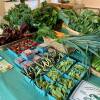On this MLK Day, I am remembering a pivotal moment in the life of Reverend Dr. Martin Luther King Jr.
In June 1966, he and his colleague in civil rights leadership — the Rev. Ralph Abernathy — were traveling through Mississippi in one of the country’s poorest counties. They stopped in the town of Marks to visit a classroom of Black students. At lunchtime, the reverends watched as the teacher cut up some apples, giving only one apple slice and a few crackers to each of the students. The scarcity shocked both pastors who could see the children were undernourished. Long after, the moment haunted Dr. King, who told his friend, “I can’t get those children out of my mind.”
Like the Rev. King, I can’t get the children who are hungry in Massachusetts out of my mind. According to Feeding America, more than 120,000 children in the state don’t know where or when their next meal will be. The number is highest among kids of color. And things have gotten worse since the pandemic. Overall, 1 in 6 Massachusetts residents is now food insecure compared to the pre-pandemic number of 1 in 12. A joint study last year by the hunger advocacy program Project Bread, Boston’s Office of Food Access and UMass Boston’s Center for Survey Research found that a lot of people who were eligible for SNAP, formerly food stamps, were not signing up to get their benefits. Many of them didn’t know they were eligible; others were afraid of being stigmatized for needing the help.
In families who are food insecure, the free breakfast and lunch for their school-age children can be the difference between running out of food or having something for their kids to eat. The public-school lunch program is three-tiered: students who pay in full, those who qualify for free breakfast and lunch and those who pay in part. There have been well-documented cases of public-school students shamed when their parents didn’t pay the cafeteria bill. I was angry and sad to see workers forced to throw out the food, instead of giving the students lunch. But, during the pandemic, all families are getting a break because the U.S. Department of Agriculture has made those meals free for all kids — a big relief for those families who otherwise wouldn’t meet the criteria for the free breakfast and lunch. The waiver effectively created a temporary universal school meals program. And now Project Bread is leading a campaign advocating for legislation to make universal school meals permanent in Massachusetts.
Under the proposed School Meals for All law, every student who wants or needs school breakfast and lunch would qualify. Parents or guardians wouldn't have to sign up or provide income information, and there would be no cost to the family. It would provide relief for struggling families and a boost for students falling behind, unable to concentrate and absorb because they don’t get enough to eat. At the recent State House hearing for the proposed legislation, Project Bread CEO Erin McAleer cited evidence that universal school meals programs, by providing financial support for low-income families, could significantly reduce childhood poverty.
By the time he witnessed lunchtime in the Mississippi classroom, the Rev. King had made the eradication of poverty and his Poor People’s campaign foundational to his civil rights mission. He spent the last years of his life reminding his many audiences about children who ached with hunger across the country and the world. And about the responsibility of rest of us to address it, “There is nothing new about poverty,” he said, “What is new, however, is that we have the resources to get rid of it.”








